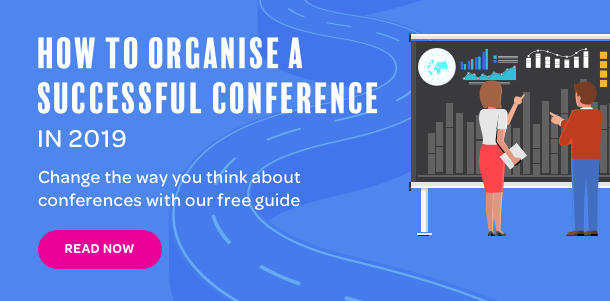Organising a conference that engages, informs and entertains delegates is easier said than done. From planning the agenda, to choosing the speakers and rolling out a promotional campaign, there are several challenges event managers need to consider.
Reviewing these potential hurdles will help highlight any specific issues or areas that need improving. For example, if your delegates like to have up-to-date event details available at any time, you should consider creating an intuitive event app.
We’ve highlighted a few challenges below to be aware of:
1. Understanding what your delegates want
The delegates are the most important element of any conference, because they decide if it’s a success or failure. Gathering as much information as you can about their likes, dislikes and motivations will help you meet their expectations of the event.
A great way to organise this information is to create delegate personas. By developing semi-fictional characters who represent typical segments of your audience, and digging into their needs and motivations, you’ll be able to choose elements that would engage or inspire them to get involved. You’ll also know how best to promote the conference to delegates in the lead-up to the event, for example which social channels to use and the opportune time to reach out to them.
2. Keeping your delegates engaged
Ensuring your delegates stay focused throughout the event and continue to pay attention can be difficult, especially if it’s over multiple days and includes several long sessions of talks or workshops.
You should critically consider every element of your conference and evaluate its likely effect on attendee engagement. First, think about the type of speaker you need – can your delegates relate to this person? Do you want sessions to include motivational speeches or informative demos?
If there’s a theme, how will it encourage delegates to get involved and take part in activities?
Scheduling in downtime and plenty of refreshment breaks is also important to help guests refuel, stay hydrated and remain alert throughout the conference.
3. Deciding on a theme
It’s important to consider your theme carefully, as it will set the tone of the event. Every element of your conference will be built around this theme, from the design to the communications, so it needs to appeal to your delegates.
Will they understand the theme’s message and be inspired? Does it a create an extra special experience for them?
Your branding should also play a key part, so delegates can quickly associate the conference with your organisation and its values.
One trend that’s becoming increasingly popular – and often factors into theming – is festivalisation - and is often factored into theme planning. This type of event is based on the traditional festival experience and strives to incorporate entertainment with educational sessions. Including live music or a comedy sketch can be an effective way to create a memorable experience for guests.
4. Choosing the right speaker
When a speaker fails to grab our attention, it’s easy to tune out and miss what's actually being said. This can even set the tone for the rest of the day and could shape a delegate’s opinion of the whole event. If they find the first talk uninteresting, they may assume your organisation doesn't have much to offer either.
Finding the right speaker for your conference is crucial because they will be representing your company. They might also be the first person your delegate listens to, so they need to be able to convey any key messages in a clear and engaging way.
When choosing your speaker, it’s worth having a conversation with them to see how they speak and act in person. This is your opportunity to find out if they are willing to interact with the audience.
It might seem counter-intuitive when you're aiming to impress, but sometimes it’s worth asking an in-house team member to speak rather than a professional – they are likely to know your topic inside-out as well as be passionate about the brand’s message. Delegates may also be impressed by how knowledgeable your company is on a certain subject and will keep this in mind when they need advice.
5. Planning what technology to use
For any conference to run smoothly, you need a communications strategy that incorporates digital technology. Ask yourself:
- Do we need an event app?
- Would our delegates be comfortable using this app to access information
- Are we sending out pre-event surveys?
- How will we notify delegates of each speaker’s slot?
- Will our delegates prefer e-tickets to the traditional paper pass?
- Will our delegates engage with this technology and does it benefit their experience?
Don’t fall into the trap of showing off every new technology out there to ‘wow’ your delegates – if it doesn’t add value to the theme or event experience, save it for another time. As they say, the simpler the better.
Planning your conference with these challenges in mind will help to avoid any pitfalls or disasters on the day. If you need a bit of inspiration to create a memorable experience, check out our in-depth guide on how to organise a conference.

By Anthony Kelly
Head of New Business MarketingMore articles by Anthony Kelly


/RS20188_Penguins_logo_MASTER_2COLOUR%20(1).png?width=1434&height=480&name=RS20188_Penguins_logo_MASTER_2COLOUR%20(1).png)
